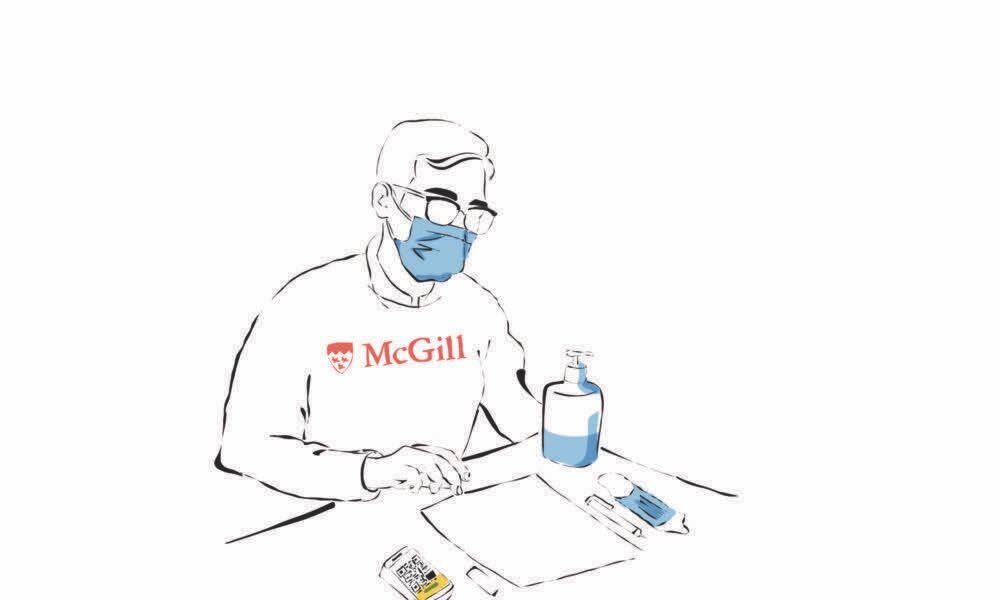As of May 24, 10 days after masking became optional in most indoor settings province-wide, wearing masks indoors at McGill will no longer be mandatory. The news that McGill would be ending its mask mandate came in an email from Associate Provost Christopher Buddle and Deputy Provost Fabrice Labeau on May 2.
The email also reported the dissolution of McGill’s Case Management Group (CMG), and thus the suspension of McGill’s COVID-19 data collection. The university will no longer track cases, measure CO2 levels in classrooms, monitor campus traffic, or record vaccination rates. And as of May 30, administrative and support staff will be required to work in person full time.
Although masking will no longer be compulsory after May 24, the provosts stressed that it is still “strongly encouraged to continue to wear a mask” and that mask dispensers and hand sanitizer stations will remain in place until further notice. However, on the McGill subreddit, students have complained about a lack of masks and empty sanitizers at the Redpath and McLennan Libraries.
The decision to end mandatory masking has been met with mixed reactions from the McGill community. Some, like Noor Jetha, U1 Engineering, think the university should have waited longer before making such a decision.
“At first glance, I felt a sense of panic,” Jetha said in an interview with The McGill Tribune. “Now that the mask mandate is being lifted, nobody’s gonna wear a mask at all, and nobody can force people to wear a mask which will make people more exposed and COVID will surge again.”
James Newman, MA’20 and president of the Association of McGill University Support Employees (AMUSE), agrees with Jetha and feels that mask-wearing by students has been lax, even with a mandate. He cited having seen some students who tested positive for COVID-19 not wearing masks when opening their front doors and other students not wearing masks while walking around their residence hallways.
Some, like Wanjun Chen, U2 Agricultural and Environmental Sciences, are still deciding whether to continue masking after May 24. For Chen, who found masking distracting during classes, the end of the mandate feels relatively safe.
“I feel [hesitant about] whether to lower my mask or keep it on, because the mask didn’t make me feel very comfortable, especially in [lectures] [….] I feel a bit dizzy with a mask because I don’t feel I got enough oxygen,” Chen said. “I think it is safe because all the other provinces in Canada already removed the mask, and they didn’t have very serious consequences, so I think it will be safe.”
In an email to the Tribune, David Juncker, professor and chair of the Department of Biomedical Engineering, explained that he believes the decommissioning of the CMG will leave the university ill-prepared for the Fall 2022 semester.
“Tracking is a good measure, and so stopping tracking is unfortunate as it will leave us flying blind at a time where cases are still high,” Juncker wrote. “The silver lining is that there is less activity on campus during the summer months, and that people can go outside and windows [can be] opened.”
Christian Tonnesen, U4 Science and vice-president floor fellow, emphasized the risks workers face on campus. Masks represented one of the few protective measures available to them, he says, alongside hand sanitizer stations and plexiglass dividers around campus.
“I suspect we will definitely see a rise in cases this August, early September, due to the amount of partying, social contact, and perhaps the biggest virulent source, Frosh,” Tonnesen wrote in an email to the Tribune.
Rose Chabot, teaching assistant and PhD candidate in the Department of Political Science, worries more about the barriers this could create for the most vulnerable members of the community.
“I am more worried about immunocompromised students and staff and the risks that attending a mask-free class would represent for them—or the barriers to education, if they decide not to take the risk,” Chabot wrote. “Personally, in a mask-free class I would feel more comfortable teaching with a lot of air circulation (open windows)—and I know this is not possible everywhere on campus.”
In an email to the Tribune, McGill media relations officer Frédérique Mazerolle explained that the COVID-19 situation in May 2022 is radically different from when the pandemic began in March 2020. Hence, McGill feels it is appropriate to follow the government’s lead on this issue and stop requiring masks.
“If the Quebec government decides to delay its timeline for making masks optional, the university may adapt its approach,” Mazerolle wrote. “McGill will continue to follow other public health measures as required by the government. The health and well-being of our community remain our top priority.”









Pingback: Protecting disability rights is the only way forward - The McGill Tribune